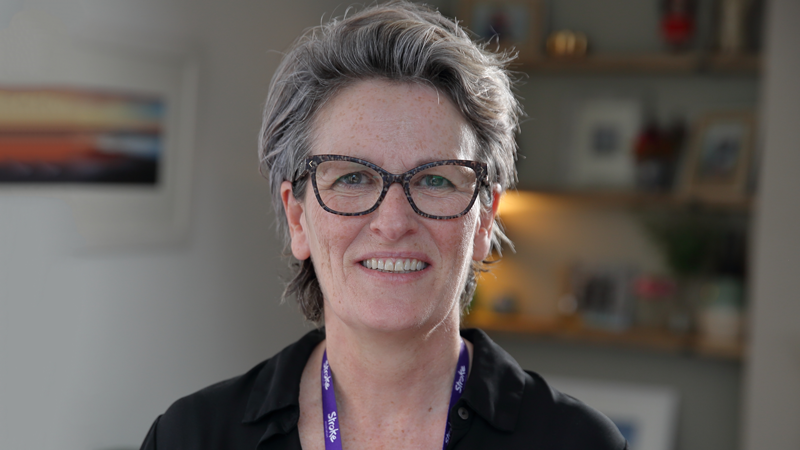Aphasia can have a huge impact on stroke survivors and their families. Aphasia is a complex language and communication disorder resulting from damage to the language centres of the brain.
I'm a communication support coordinator in South Wales and it's my job to try to help people through adjusting to this impact of stroke and support with their communication needs and offer to their family and friends. Go to this webpage to see what services and support are available in your area.
Communication Support Coordinator Deb McCann

I've always been fascinated by how people communicate. My working life has involved finding different ways to support people to communicate in any way they can, whatever their needs. I love to talk and get to know people and aim to make them feel comfortable and, most importantly, relaxed.
When a stroke survivor meets me for the first time, they usually haven't left the house since their stroke. They can feel like they've lost themselves and their confidence. But introducing our support can be the first step in the many small ones to finding themselves again. It's just as important for their carer and family members to come along on the journey too - they want to understand more too.
Generally, I don't receive a diagnosis. I'm there to concentrate on what the person wants to achieve and why they want my support. In my area, we're fortunate to be able to provide one-to-one support for stroke survivors who have communication needs. They can be in person or virtual.
My first venture is to find out what makes that person tick, what I do in the sessions needs to connect and inspire that person. Each one is designed around the stroke survivor in terms of activities, hobbies and personality.
As our relationship grows, I'm able to sense what helps them communicate. For some it's with humour, but with others, a more steady approach is needed.
To give you a taste of what my typical week might look like:
I visit a gentleman and his wife to do sign a long - or, more simply put, gestures. We agree together that this would be worth trying because we found that sounds and words are difficult for him to practice. The more he uses these gestures, the more words jump out spontaneously. As he can only use his left hand at the moment and he was previously right-handed, we have adapted or made up some gestures between us. His wife and family are learning them, too.
The frustration they both felt at not knowing what he wanted was impacting on them emotionally. To say that the house is raucous when I visit is an understatement. We all have so much fun making the gestures up. I leave the house with them on a high and I hope I leave them feeling like they are making steady, enjoyable, progress.
Next I visit a stroke survivor who is unable to leave the house. Her children had told me that she wouldn't participate in anything, didn't want anyone to visit and would shut down in the presence of others.
I found out that she worked in hospitality alongside her husband until he passed away. So when I went to visit her at home, I draw on my experience working in hospitality, and we made an instant connection. She tut tutted at my stories of bad service and chuckled to herself. I was then able to design sessions based around her wants, wishes and needs because she was so open with me.
I generally try and use my one-on-one sessions as a stepping stone to bringing stroke survivors together in the community. This may mean signposting to peer support and activity groups locally, the Stroke Group Network, other community organisations or my own communication groups - these are both community based.
This week I have a communication group in a community venue. It's a small group and for a good reason. It's for stroke survivors who have high-support needs. This means they may have become isolated and are less likely to join any other groups presently because of their confidence and not wanting to be overlooked or embarrassed with regards to their aphasia.
Most in the group have had one-on-one sessions at home with me and have happily progressed to this group once they are comfortable, this is a stepping stone to rebuilding their lives after stroke and gives carers the opportunity to meet, too. We all come together towards the end of the group for stroke survivors to share their learning. We communicate with each other using words, sounds, gestures, signing, writing and drawing.
Sometimes we laugh and sometimes we get frustrated. But it's just amazing to see the effort that goes in. They have all created a strong bond and support and encourage each other. To see laughter where there were once tears from anxiety and depression is wonderful.
When I first meet a stroke survivor with aphasia I can be overwhelmed sometimes as to where to start. Thinking creatively and outside the box and not being afraid to fail and try again is always my approach. I see the commitment and hard work that leads to people feeling different, with their head up instead of down, it's unbelievable. I will never stop learning from stroke survivors and carers.

Find out more about our people
More information
- For more information on whether this service, or similar, is available in your area visit our Support in your area webpage.
- Please visit our Aphasia Awareness page where you can learn about Communication Access UK and the Communication Access Symbol, a new disability access symbol underpinned by a completely free training package and standards. We hope that these will help you, and your businesses or organisations to better support people with communication difficulties.
- Click here to download our Communication Support service leaflet.
